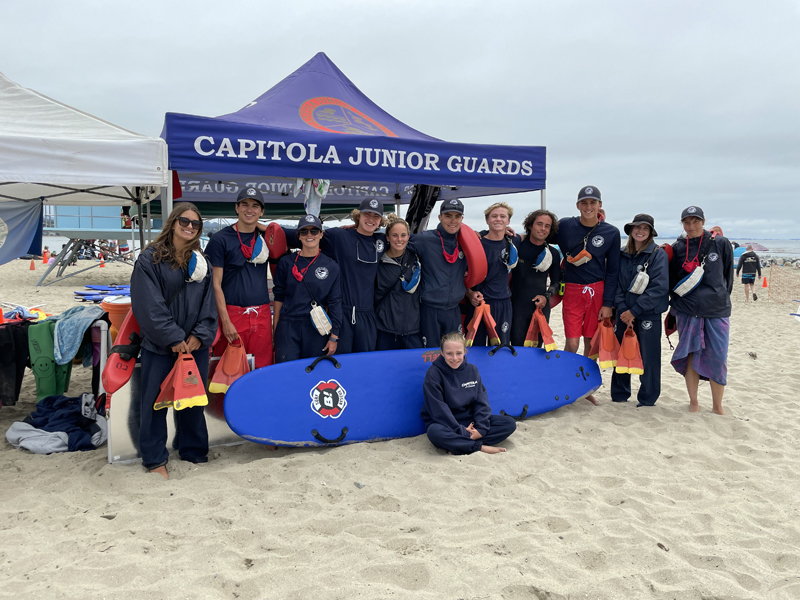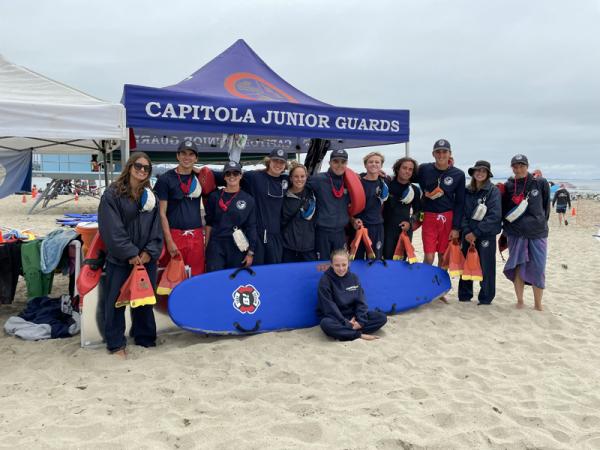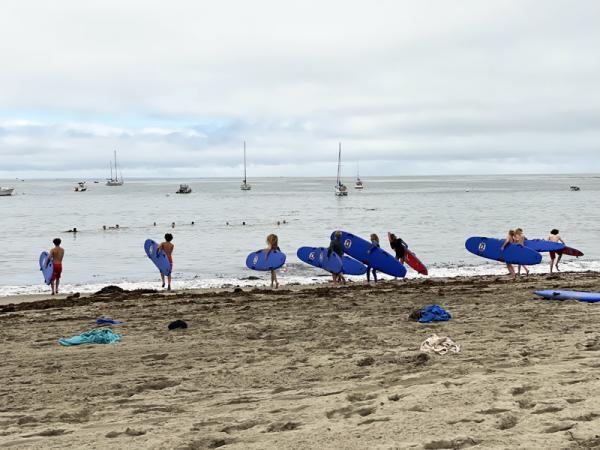KID REPORTERS’ NOTEBOOK
Kids Learn About Ocean Safety


Ella (center) with Capitola Junior Lifeguards in Santa Cruz County
In the coastal areas of California, junior lifeguard programs are a popular summer activity for kids. Organized by the USLA (United States Lifeguard Association), the programs aim to teach young people about ocean safety, first aid, and sportsmanship.
Participants must show that they can swim and enter the ocean comfortably before joining a program. Professional lifeguards act as instructors, helping kids to build confidence in the water. The guards lead the youngsters through challenging physical workouts, beach rescue situations, games, and competitions.
In June in Santa Cruz County, one of several local junior lifeguard programs began at Capitola Beach. I have participated in the Capitola program since I was 6 years old—with the exception of 2020, when the program was modified due to the coronavirus pandemic. This branch of junior lifeguards “was founded by two brothers whose goal was to teach ocean safety, as well as up-and-coming generations advanced life-saving techniques,” Brennan Howard, the program’s coordinator, told me.
A FAVORITE SEASONAL ACTIVITY
Participants range in age from 6 to 17. For workouts and competitions, they are grouped according to age.
Many junior lifeguards start the program at an early age and grow to love it. Returning year after year, they look forward to being at the beach with friends they’ve made in previous summers.
In a typical summer, there are two four-week sessions and three competitions held on different beaches in the county. Main events include swimming, paddleboarding, and running, or a combination.
The competitions can be individual or relay races. Some of the popular events include the R-S-R (Run-Swim-Run), Rambo Relay, and Beach Flags. With hundreds of kids competing, only a select few make it to the top 10, scoring points for their team.
Kids in the older age groups are taught how to react to serious situations in the ocean and how to perform mock rescues. “I’ve learned a lot from the Capitola Junior Lifeguard program,” said participant Zoe Adams, 13, “including CPR [cardiopulmonary resuscitation], unconscious water rescues, and how to save a drowning person. It’s a great program for all ages and just fun for everyone, no matter the skill level.”
Each session, an entire day is dedicated to learning about sun safety. Staff members from the nearby John Wayne Cancer Foundation come to the beach and teach junior lifeguards how to stay safe in the sun and cancer-free. The staff members provide free samples of sunscreen, hats, and other items that protect the skin from excessive sun exposure.
“MEGA MONDAY”
In the final week of a session, an event called “Mega Monday” takes place. Participants ages 9 and above complete an obstacle course that can take an hour or more to finish. The competition consists of long runs and swims, one after the other. Swims take place around buoys and even the wharf. The runs, which span the length of the beach, occur several times throughout the day.
Finishing the Mega is a huge accomplishment for Junior Lifeguards. Those who complete the challenge have their name, ranking, and time written on a whiteboard.
On the last day of the session, the little lifeguards (ages 6 to 8) participate in a graduation check-out swim around one of the buoys in the bay. Attired in wetsuits, caps and goggles, the kids swim with the assistance of a parent or guardian and several instructors. Junior lifeguards cheer as the youngsters finish on the beach.

Capitola Junior Lifeguards enter the ocean during a rescue drill.
TOP COMPETITORS
Regional competitions between beaches—locally, statewide, nationally, and internationally—also take place, Howard told me. Participants who have a competitive drive and perform well throughout the session are selected to compete in a regional competition. Participants ages 9 and above look forward to the announcement of guards who have been chosen to compete on the regional level. Regional teams travel on buses to the location of the competition, which changes every year. Medals are given for first through fifth place in each event. At the age of nine, I won a first place medal in the rescue relay race at the regional competition in Coronado Beach.
“These competitions demonstrate proficiency for the city of Capitola,” Howard said, “and help coordinators from around the world swap ideas, techniques, and culture.”
